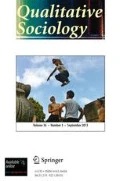References
Becker, Howard S. (1986).Writing for Social Scientists. Chicago: University of Chicago Press.
Butler, S. & Rosenblum, B. (1991).Cancer in two voices. San Francisco: Spinsters Book Company.
Callaway, H. (1992). “Ethnography and experience: Gender implications in field work and texts.” In J. Okely, & H. Callaway (Eds.),Anthropology and autobiography. (pp. 29–49) New York: Routledge, Chapman and Hall.
Clifford, J. & Marcus, G. E. (Eds.) (1986).Writing culture: The poetics and politics of ethnography. Berkeley: University of California Press.
DeVault, M. (1995). “Ethnicity and Expertise: Racial-ethnic knowledge in sociological research.Gender & Society. 9:612–631.
DeVault, M. (1990). “Talking and listening from women's standpoint: Feminist strategies for interviewing and analysis.Social Problems. 37:96–116.
Edwards, R. (1990). “Connecting method and epistemology: A white woman interviewing Black women.Women's Studies International Forum. 13:477–90.
Ellis, C. (1995).Final negotiations: A story of love, loss, and chronic illness. Philadelphia: Temple University Press.
El-Or, T. (1992). “Do you really know how they make love?: The limits on intimacy with ethnographic informants.”Qualitative Sociology 15: 53–72.
Erikson, K. (1967). A comment on disguised observation in sociology.Social Problems, 14, 366–373.
Fine, M. (1992).Disruptive voices: The possibilities of feminist research. An Arbor: University of Michigan.
Ginsberg, F. (1989).Contested lives. Berkeley and Los Angeles: University of California Press.
Harper, D. (1982).Good company. Chicago: University of Chicago Press.
Harding S. (1986).The science question in feminism. Ithaca and London: Cornell University Press.
Harding, S. (1987).Feminism and methodology. Bloomington, Indiana: Indiana University Press.
Klatch, R. (1988). “The methodological problems of studying a politically resistant community.”Studies in Qualitative Methodology. 1, 73–88.
Kreiger, S. (1983).The mirror dance: Identity in a women's community. Philadelphia; Temple University Press.
Kondo, D. (1990).Crafting selves. Chicago: University of Chicago Press.
Punch, M. (1994). “Politics and Ethics in Qualitative Research.” In N. Denzin and Y. Lincoln (Eds.),Handbook of Qualitative Research. (pp. 83–97) CA: Sage Publications, Inc.
Rabinow, P. (1986). “Representations are social facts: Modernity and post-modernity in ethnography.” In Clifford and Marcus (Eds.)Writing Culture: The poetics and politics of ethnography. (pp. 234–261) Berkeley: University of California Press.
Reinharz, S. (1992).Feminist methods in social research. London and New York: Oxford University Press.
Richardson, L. (1994). “Writing: A method of inquiry.” In N. Denzin and Y. Lincoln (Eds.),Handbook of Qualitative Research. (pp. 516–529) CA: Sage Publications, Inc.
Riessman, C. K. (1987). “When gender is not enough: women interviewing women.”Gender & Society. 1:172–207.
Robillard, A. (1994). “Communication Problems in the Intensive Care Unit.”Qualitative Sociology. 17: 383–395.
Stacey, J. (1990).Brave new families. New York: Basic Books.
Van Maanen, J. (1988).Tales of the field: On writing ethnography. University of Chicago Press.
Wasserfall, R. (1993). “Reflexivitiy, feminism and difference.”Qualitative Sociology, 16, 23–41.
Williams, C. and Heikes, E. (1993). “The importance of researcher's gender in the in-depth interview: Evidence from two case studies of male nurses.Gender & Society. 7:280–291.
Zola, I. (1982).Missing pieces: A chronicle of living with a disability. Philadelphia: Temple University Press.
Author information
Authors and Affiliations
Rights and permissions
About this article
Cite this article
Hertz, R. Introduction: Ethics, reflexivity and voice. Qual Sociol 19, 3–9 (1996). https://doi.org/10.1007/BF02393245
Issue Date:
DOI: https://doi.org/10.1007/BF02393245

